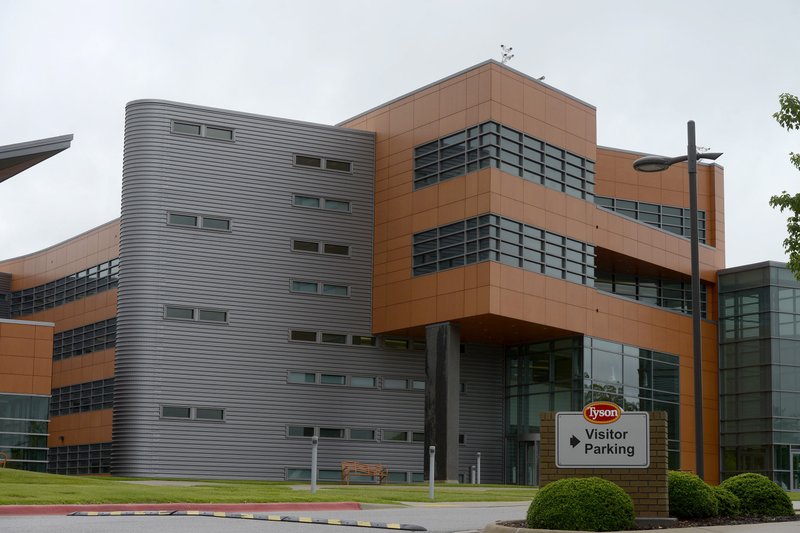Tyson Foods Inc. on Monday announced its next chief executive as it detailed the challenges of a pandemic that is driving up costs.
Chief Executive Officer Noel White, 62, will step down after just two years, but he will remain at the company as executive vice chairman, Tyson said Monday as it released its quarterly earnings report. White's replacement, effective Oct. 3, will be Tyson President Dean Banks, 46.
White, who joined Tyson with the acquisition of IBP, has 37 years of industry experience and led the company the past two years through a period of volatility and uncertainty.
"Tyson's future is bright with Dean at the helm," White said.
Banks joined Tyson's board of directors in 2017 and became company president last year. Before that, he had leadership roles at a health care venture capital firm and at X, the research and development arm of Google parent Alphabet Inc. His background in entrepreneurship, technology and health care makes him a good fit to lead the company as it adopts more technology and puts greater focus on worker health and safety, John Tyson, heir and chairman of the board of directors, said in a statement.
Banks said he was "honored to lead Tyson as its next CEO."
Tyson reported net income of $527 million during a third quarter mired with challenges brought by the coronavirus pandemic.
Despite production slowdowns, increased operational costs and hundreds of millions of dollars spent to make facilities safer for employees, Tyson posted earnings of $1.44 per share, down 22% from last year's third quarter.
"It was without a doubt one of the most volatile quarters," White said in a conference call with analysts. The pandemic has not only infected workers but also disrupted trade and sales channels, backlogged animal supplies and changed people's eating habits.
The quarter's results beat Wall Street expectations.
Tyson, which produces 20% of America's beef, pork and chicken, spent $340 million on efforts to address covid-19 throughout its supply chain during the quarter. This included worker health and safety costs such as protective gear and virus testing; production downtime; sanitization; and $114 million in bonuses to front-line workers. Premiums paid to cattle producers and other indirect costs were not included.
Despite these head winds and extra costs, sales were $10 billion in the three months that ended June 27, bolstered by beef and pork results and offset by weak chicken results and international pricing. This is down 8% from the $10.9 billion in sales reported for the same quarter a year ago.
Production declined across all business segments because of covid-19, resulting in lower sales volumes compared with last year, except for international sales. Beef and pork prices rose in the period because of supply chain disruptions, bolstering prepared-foods prices. Chicken prices were weaker, and that was attributed to market conditions.
With fewer people eating at restaurants and with slower production output, analysts expected earnings of 94 cents per share, according to a FactSet consensus estimate. Instead, Springdale-based Tyson reported adjusted earnings of $1.40 per share, which fell short of Stephens' estimate by 5 cents.
Ben Bienvenu, an agribusiness analyst with Stephens Inc., noted that the miss came from lower sales and higher expenses, partially offset by higher gross margins and lower taxes. Tyson had a "solid beat" overall but "faces headwinds throughout 2021 as livestock supply tailwinds wane," he said in a market report.
Operating income for beef and pork both swelled compared with last year as prepared foods declined. Chicken and international posted losses.
Beef's operating income grew 135%, to $651 million, from a year ago. Pork rose 155%, to $107 million, for the period. Prepared foods declined 37%, to $145 million.
Chicken reported a loss of $120 million, and international had a loss of $8 million. Chicken results were also affected by $21 million in restructuring costs for the nine months ending June 27.
Tyson did not provide an outlook because of uncertainty created by the pandemic, but it warned investors that challenges are expected to increase in the coming months.
Last week, Tyson said it will begin randomly testing thousands of workers weekly to keep plants operational and combat the coronavirus. About 1% of its workforce is infected with the virus. About 141,000 people work for Tyson.
For fiscal 2020, which ends in September, Tyson is expecting capital expenditures to be $1.2 billion and net interest expenses to be $470 million. Liquidity, which was $3.1 billion as of June 27, is expected to remain above $1 billion.
Tyson shares rose 98 cents, or 1.59%, to close Monday at $62.43 on the New York Stock Exchange. Share prices have been as high as $94.24 in the past year and as low as $42.57.

